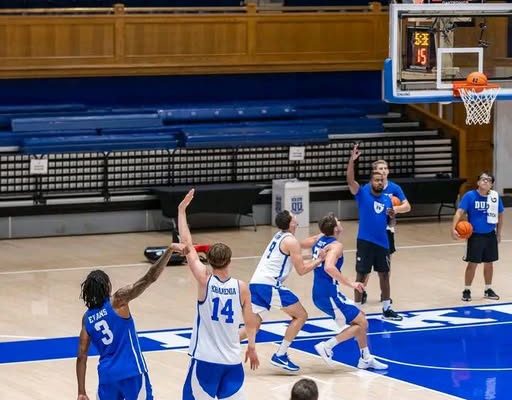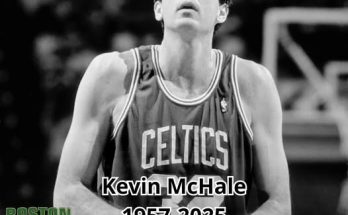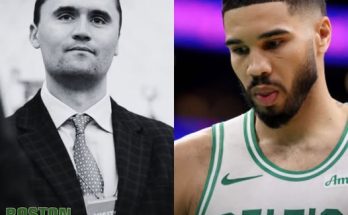**Why Next Season Could Be the Most Controversial in Duke History**
Duke Basketball is no stranger to high expectations, passionate debates, and polarizing narratives. But as the 2024-25 season approaches, the Blue Devils find themselves at the center of what could become the most contentious chapter in the program’s storied history. With a roster that blends elite talent, unproven potential, and lingering questions about fit and chemistry, the divide among the fanbase is already palpable. And with the weight of championship-or-bust expectations looming, the pressure on Jon Scheyer’s squad is unlike anything we’ve seen in years—perhaps ever.
On paper, Duke’s roster is stacked. The Blue Devils boast the nation’s top recruiting class, headlined by Cooper Flagg, the most hyped prospect since Zion Williamson. Flagg isn’t just a potential No. 1 pick—he’s being labeled a program-changing talent, a once-in-a-generation player who could single-handedly elevate Duke to title contention. Alongside him are fellow five-star freshmen Khaman Maluach, Isaiah Evans, and Kon Knueppel, each bringing unique skills that could make this team unstoppable.
But here’s where the controversy begins: Duke isn’t just relying on freshmen. The return of key veterans like Tyrese Proctor and Caleb Foster adds experience, but it also raises questions about roles. Proctor, once seen as a future NBA guard, struggled with consistency last season. Foster showed flashes but wasn’t the dominant force many hoped he’d be. Now, with Flagg expected to dominate the ball and the spotlight, how will the returning players adjust? Will they embrace supporting roles, or will there be friction over touches and leadership?
Then there’s the wild card: transfers. Duke added impact players like Maliq Brown (Syracuse) and Sion James (Tulane), both of whom were stars at their previous schools. But integrating transfers into Duke’s system has been a mixed bag in recent years. Some, like Jacob Grandison, faded into the background. Others, like Ryan Young, carved out crucial roles. Will Brown and James accept being role players, or will their expectations clash with Scheyer’s vision?
Jon Scheyer is entering his third season as Duke’s head coach, and while he’s maintained the program’s elite recruiting prowess, on-court results have been… complicated. His first season ended in a disappointing second-round NCAA Tournament exit. His second season saw improvement—an ACC Tournament title and an Elite Eight run—but it still fell short of a Final Four, the standard at Duke.
Now, with arguably the most talented roster in the country, Scheyer has no more excuses. If Duke underachieves, the criticism will be relentless. Some fans already question whether he’s the right coach to maximize this group’s potential. His offensive system has been criticized as too rigid, his rotations too inconsistent. Others argue he’s still growing into the role and deserves patience.
But patience is a luxury Duke doesn’t have. Not with this roster. Not with these expectations. If Scheyer stumbles early—say, with a loss to a lesser non-conference opponent or a shaky start in ACC play—the noise will be deafening. And if Duke fails to reach the Final Four? The calls for scrutiny will grow louder than ever.
Cooper Flagg is the crown jewel of this Duke team, but his presence brings as many challenges as it does advantages. The hype around him is unprecedented. He’s already being compared to Duke legends like Grant Hill and Shane Battier before playing a single college game. The media will dissect every shot, every turnover, every expression. The pressure on him will be immense.
But what happens if he’s not *immediately* transcendent? What if he has a few off nights early in the season? The overreactions will be swift and brutal. Social media will erupt with hot takes about him being “overrated.” Opposing fanbases will revel in every struggle. And within Duke’s own fanbase, there will be factions—those who defend him unconditionally and those who expect nothing short of perfection.
Even if Flagg is as good as advertised, his dominance could create unintended consequences. Will other players resent the attention he gets? Will the offense become too Flagg-centric, making Duke predictable? The balance between letting a superstar shine and maintaining team cohesion is delicate, and Scheyer will have to navigate it carefully.
Duke has had super-teams before. The 2018-19 squad, led by Zion Williamson, RJ Barrett, and Cam Reddish, was supposed to cruise to a title. Instead, they fell short in the Elite Eight. The 2021-22 team, featuring Paolo Banchero and AJ Griffin, was stacked—yet they lost in the Final Four to their archrival, North Carolina.
This history looms large. Duke fans know better than anyone that talent alone doesn’t guarantee championships. And with so much riding on this season—Scheyer’s reputation, Flagg’s legacy, the program’s continued dominance—the fear of another heartbreak is real.
Duke’s fanbase is split. One faction believes this team is destined for greatness, that Flagg will lead them to a title, and that anything less is a failure. The other faction worries that the hype is out of control, that the pieces might not fit, and that the pressure could crack the team before March.
This divide is playing out on message boards, podcasts, and social media. Every practice rumor, every preseason scrimmage report, is analyzed to death. Some fans are already predicting a 30-win season. Others are bracing for drama. The tension is building, and the season hasn’t even started.
Behind the scenes, the atmosphere is undoubtedly intense. Scheyer knows what’s at stake. The players feel the weight of expectations. The coaching staff is working overtime to ensure this group gels. But chemistry isn’t something that can be forced. It either develops naturally, or it doesn’t.
There are whispers about how the team looks in closed scrimmages. Some say the offense is unstoppable. Others worry about defensive lapses. The truth is, nobody really knows what this team will be until the lights come on.
One thing is certain: This season will be a rollercoaster. There will be moments of brilliance—games where Flagg looks like the best player in the country, where the offense hums, where Duke looks unbeatable. And there will be moments of frustration—head-scratching losses, puzzling rotations, and the inevitable social media meltdowns.
When it’s all over, will this team be remembered as one of Duke’s all-time greats? Or will it go down as another “what-if” story, a collection of talent that never quite reached its potential?
The answer will define Jon Scheyer’s legacy, Cooper Flagg’s place in Duke lore, and the future of the program itself.
And that’s why next season could be the most controversial in Duke history.



